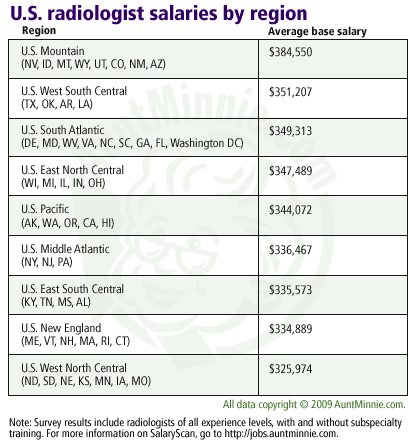Nuclear medicine technologists perform diagnostic testing that employs drugs with possess radioactive properties to produce pictures of tissues in the body. The need for nuclear medicine technologists in Alabama will increase by more than 13 percent from 2008 through 2018, predicts the Alabama Department of Industrial Relations. A sophisticated kind of testing, nuclear medicine testing is not performed at every hospitals, making the demand for technologists highest in Alabama's major cities.
Statewide
Nuclear medicine technologists in Alabama made an average of $58,560 per year as of May 2009, reports the U.S. Bureau of Labor Statistics. Technologists salaries in the state were 14 percent below the U.S. national yearly average, which was $68,450. Alabama ranked as seventh lowest-paying state for technologists in the country. Salaries for techs in Alabama ranged from $42,280 per year or less for the lowest-paid 10th of technologists to $78,270 per year or more for the highest paid 10th.
North Alabama
The city of Huntsville featured the highest average annual salaries for nuclear medicine technologists in Alabama as of May 2009, reports the U.S. Bureau of Labor Statistics. Technologists in the city made an average of $61,990 per year, about 6 percent above the statewide average. Nuclear medical testing services are offered in Huntsville facilities like Huntsville Hospital. In the northeastern rural areas of Alabama, nuclear medicine technologists earned an average of $51,780, about 12 percent below the Alabama average. Counties included in this area of the state include Chalmers, Cherokee, Clay, Cleburne, Coosa, DeKalb, Jackson, Marshall, Randolph, Talladega and Tallapoosa.
Central Alabama
In Hoover and Birmingham, nuclear medicine technologists received an average of $60,160 per year, according to the U.S. Bureau of Labor Statistics. The lowest-paid 10 percent of technologists earned $44,360 or less per year, while the highest-paid made $79,710 or more annually. Employers for nuclear medicine technologists in the Birmingham and Hoover area include hospitals like the Birmingham VA Medical Center. Outpatient diagnostic centers also employ technologists to perform nuclear medicine testing, such as St. Vincent's One Nineteen Health and Wellness in Hoover.
Educational Programs
To become a nuclear medicine technologist, a degree from a program accredited by the American Registry of Radiologic Technologists is necessary. As of February 2011, the ARRT had accredited a nuclear medicine program at only one college in Alabama: the University of Alabama at Birmingham. This program culminates in a Bachelor of Science degree and requires four years of full-time study to complete. In addition to taking classroom based courses in subjects like radiation physics and radiopharmacy, students in the program participate in three clinical internship rotations in medical facilities in the Birmingham area.
Canker sore treatment vary based on their kind and severity. It really is helpful to understand about the triggers that are possibly associated with your canker sore outbreaks to possibly lessen the frequency of your canker sore events there's no known cure for canker sores.) More info: weblink

